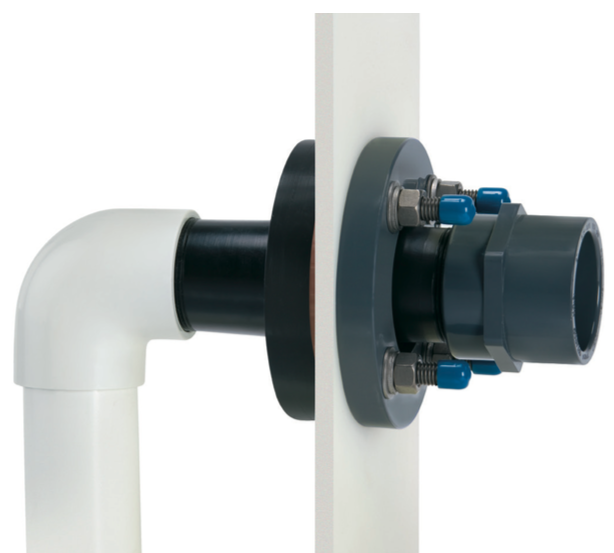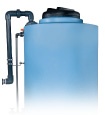Chemical Compatibility of B.O.S.S. Fittings
It’s common knowledge that the chemical application of any industrial storage system is key to knowing which type of tank to choose. The same holds true for the fittings and accessories used on the chemical storage tank. Let’s take a closer look at chemical compatibility in regards to gaskets and fittings, and how the B.O.S.S. Fitting® (bolted one-piece sure seal) works.
Why Do Fittings Need To Be Chemically Compatible?
Fittings and gaskets have to be chemically compatible because they perform an important function in the tank system. If they are not, the fitting can deteriorate because of corrosion or chemical attack, causing a leak in the tank. A gasket can deteriorate as well, causing an improper seal and more problems. A good example is a chemical storage tank system storing sodium hypochlorite that uses a stainless steel 316 fitting. Sodium hypochlorite (bleach) is an oxidizing chemical and would corrode a stainless steel fitting, causing a breach at the fitting site. Titanium would be a much better choice for the fitting material because it is resistant to oxidation. The right fittings can mean the difference between a functional system and one that fails.
Choosing Options That Protect
The more corrosive a chemical is, the more important it is to contain it safely. There are a number of products available to help ensure proper containment. One of these is the OR-1000 antioxidant system which is added to a cross-linked polyethylene (XLPE) storage tank during manufacturing. The benefit of OR-1000 is that tanks have strength and resiliency of XLPE with a special, resistant inner surface that has a seamless bond to the tank system. OR-1000 is an innovation that was created to significantly extend the life of the tank and the chemical inside, but without the proper fitting, the technology cannot do its job.
Advantage of the B.O.S.S. Fitting®
The B.O.S.S. Fitting® was designed and developed to be the premier fitting for Poly Processing tanks. It works with or without the OR-1000 system. Like most other bulkhead fittings, it is installed from the inside of the tank. Due to its one-piece design, it protects the cross-section of the tank where the hole was drilled for the fitting. Without a proper fitting in that spot, the exposed XLPE on the cross section would be susceptible to a chemical attack.
The B.O.S.S. Fitting® is streamlined - its one-piece design provides maximum protection for the tank. The injection molded fitting is made of polyethylene, the same material the tank is made of, so it can withstand exposure to a variety of chemicals. The hardware materials used depend on the chemical being stored. Hardware options include 316 stainless steel, titanium or C-276. Each are color coded, and encapsulated into the B.O.S.S. Fitting®. With a traditional flange fitting, a PVC or CPVC , the flange fitting will have 4-8 bolts depending on the size of the fitting. Each of these bolts have their own gaskets which increases the number of potential leak paths.

The B.O.S.S. Fitting® has one gasket surface, minimizing the sealing surface to a single point. A full range of gasket materials are available including but not limited to EPDM, Viton, and Viton GF. The bolts are welded to a common metallic ring and are an integral part of the injection molded polyethylene fitting, which gives the end user a robust fitting unlike any composite fitting on the market. The integral metallic ring allows the end user to increase the torque on the B.O.S.S. Fitting® giving an even better sealing surface on the sidewall of the tanks. The B.O.S.S. Fitting® eliminates the room for human error, even if a mistake is made and the tank is loaded with the wrong chemical, the wetted portion of the fitting is polyethylene.
All of these precautions help ensure a safe and effective chemical storage tank system. If you need more information, talk to a chemical storage expert.
- November 17, 2015
- Topics: Fittings and Accessories
About Poly Processing
Posts By Topic
Tech Talk Podcast Episodes
Subscribe By Email
Recent Posts
- Why Cycling Causes Tank Failure: Tips for Prolonging Tank Life
- Small Changes in Tank Selection for Big Long-Term Cost Benefits
- NSF Certification vs. FDA Compliance: Understanding Chemical Tank Standards
- Why Chemical Storage Tank Wall Thickness Matters and How to Get It Right
- The Best of 2025 - Top 5 Chemical Storage Blogs
Tank Configurator

Find the recommended tank and system components for your chemical storage challenge.
Configure a Tank Package


